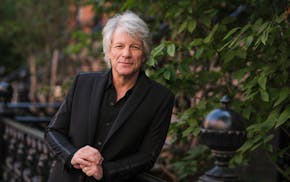TINLEY PARK, Ill. – Some 60 years after they graduated from grammar school, the Rys sisters sat down and had a meal with a classmate for the first time.
Over soup and coffee, Kathleen Rys, 72, and her sister Lorraine O'Kelly, 70, made amends with one of their childhood tormentors, Bruce Smit, 71.
Lorraine and Kathleen Rys were in third and fourth grade when their family moved from Chicago to Monee in the 1950s. As new kids at school, they soon found themselves on the outs.
"I don't know how it all started, but by the time I was in sixth or seventh grade, everyone was avoiding the Rys sisters," said Smit, a podiatrist whose wife, Tammy, organized the breakfast forgiveness meeting.
As the group discussed the memories, wounds and scars that bullying can have on both victim and perpetrator, they pondered the reasons it happened at all. Was it because the sisters were shy? Was it because some kids thought they were of American Indian descent? (They're Bohemian.) Was it because they didn't fight back?
What is clear, Kathleen said, is that however petty or fleeting the excuse, the pain of being shunned by an entire student body goes deep and stays there "forever."
"It was terrible, just terrible," said Lorraine, through tears. "Somehow the whole entire school got against us. Not just one, not just two. The whole entire school. Not one person talked to us. Not one person wanted to get near us. It was like we had the plague."
No one ate lunch with them, made plans with them or sat next to them on the bus. They didn't go to dances or join clubs. "We were the untouchables," Kathleen said.
She still has her yearbook that doesn't contain a single signature. "We only had each other," Kathleen said.
Tormented by his cruelty
After he didn't make the basketball team in high school, Bruce Smit joined the band and found new friends. The Rys sisters fell off his radar.
It wasn't until he was in medical school that vivid memories of his own cruelty began to haunt him, he said.
"My earliest recollection was in sixth grade, when you start changing classrooms. Everybody's in the hallways and I would be with the other guys and see Kathleen walking down the hallway, her head down, holding her books, walking slowly. And all of us guys would be flat against the wall until she passed. … Now how rude is that?" he said, wiping at tears.
With his chosen profession one of healing, Smit said for decades he was plagued by the image of himself inflicting pain. "We were cruel," he said. "And for apparently no reason other than following the crowd."
Over the years, Tammy Smit said, "Bruce would just start to cry at times. He'd wonder what happened to the sisters, if they landed OK."
'A beautiful grace'
So Tammy took to the internet and within a few hours found an address for Kathleen in Oak Forest. Then she went on Facebook and found Mary O'Kelly, Lorraine's daughter, and offered to set up a meeting.
The notion of revisiting the pain was not well-received by Kathleen, who had never married or even gone on a date.
"I have very few friends today," she said. "It's been hard for me to make friends."
After high school, Kathleen landed a job with the Illinois Central Railroad. Things went well until the company hired one of her former classmates, who picked up where she had left off. "I thought, 'Not again. Even here?' " Kathleen recalled.
Lorraine fared better, landing a job with the Federal Reserve Bank, where she met her husband, and later working at Oak Forest Hospital. She made friends and had three children.
It took some convincing, but Lorraine finally got Kathleen to agree to meet with Bruce.
"I told her if someone wants to apologize, you have to accept it," Lorraine said.
When they gathered at the restaurant, Bruce and Tammy hovered in a corner while Bruce gathered his composure.
A few tables over, the sisters sat watching. Finally, seeing how stressed Bruce appeared to be, Lorraine yelled out, "I forgive you." Then Kathleen echoed the sentiment.
Bruce broke into tears. "I'm so ashamed," he said.
He said he hopes his apology will prompt others to seek forgiveness for the pain they inflict on others. "Stop and think about what you're doing," he said. "Think about the lifelong scarring. … I was an adult before it rang a heavy bell in my heart, but it shows it's never too late to seek forgiveness."
Lorraine said, "This is a beautiful thing. It's like a beautiful grace. It's just wonderful that a person from 60 years ago can ask for forgiveness. It's like a miracle to us. It's a healing to us."

Kao Kalia Yang, Edel Rodriguez and others bring us gorgeous new picture books

After 4 decades in music and major vocal surgery, Jon Bon Jovi is optimistic and still rocking

Lt. Gov. Peggy Flanagan hits the runway at Native Nations Fashion Night

